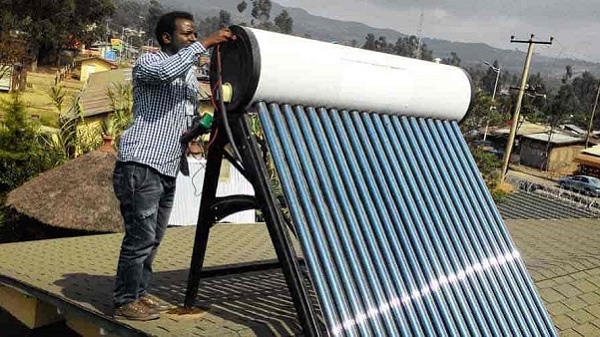
The Ethiopian Climate Innovation Center (ECIC) funds solar lighting companies in Ethiopia, in grant form, so that they can provide solar energy especially to rural communities.
(infoDev)–Biniyam Tesfaye was working as an electrical power engineer in Addis Ababa in 2014 when he came upon a colleague one day weeping at her desk.
“What’s the matter?” he asked her, concerned.
Raising her head, the colleague explained that her mother, who lived far out in the country, was gravely ill. But they could not talk because her mother’s phone could only be charged by walking 12 kilometers to the nearest town — something not possible in her condition. The two were seemingly separated by an impassable gulf. The colleague was heartbroken.
Biniyam, touched by his colleague’s situation, used his engineering skills to design a small solar mobile charger — something that could power the mobile phones of off-grid villagers and bring them a little bit closer to loved ones elsewhere in the country. That is how his company, Winsol, got started.
Solar Lighting Up The Country
Since then, Winsol — backed by the Ethiopian Climate Innovation Center (ECIC) with a $35,000 grant — has sold more than 15,000 solar mobile chargers and 10,000 solar home systems.
In his quest to help his colleague, Biniyam touched upon a crucial need of Ethiopian households. According to World Bank Group data from 2014, roughly 27% of the Ethiopian population has access to electricity. In a country of 100 million people, this means more than 70 million people without power in their homes. Around 80 million people in Ethiopia live in rural areas, and while a small fraction of these households is starting to power up, there is still a long way to go.
“The demand is very big,” Biniyam said in a recent interview. “Ethiopian communities are sparsely populated” making it hard to connect rural villages to the grid, he said. According to the International Telecommunication Union, there are around 42 million mobile phone users in Ethiopia — significantly more people than those with access to electricity.
The market is so big, Biniyam said, that “we can’t reach the demand [on our own] … So we need to share this market.”
Woman Power
Netsanet Behailu, the founder of solar lighting company NBK, is one of the ECIC-backed entrepreneurs sharing the market with Biniyam. Also an engineer by training, she worked for the government for thirteen years on power grid projects before starting her company in 2014.
NBK, also funded with a $35,000 grant from the ECIC, is one of the few Ethiopian solar lighting companies with a product designed after consulting farmer needs. In the Chacha district, north of Addis Ababa, for example, NBK conducted a need assessment and found that farmers want 10+ watt systems.
● SEMONEGNA ON SOCIAL MEDIA: Facebook| Twitter| Instagram| Pinterest
“There’s a high demand from farmers for solar home systems”, said Derese Dememe, director of the Chacha Energy Bureau. However, most of the thirteen companies the bureau work with supply small 3-5 watt solar home systems. NBK is the exception, providing 12-20 watt systems, capable, for example, of playing a radio. “Farmers want [these] larger systems,” Derese said.
Since 2015, NBK has supplied 775 units across several Ethiopian woredas, or districts. With ECIC funding, Netsanet plans to move manufacturing capacity from China to Addis Ababa, and increase production from 800 units to 1200 units annually. She’ll be adding three to four employees to her twelve-person company.
Read the complete story at infoDev
——
See also:
- Ethiopia and UK Sign Energy Compact
- What Ethiopia’s Energy Sector Looks Like: Overview
- Solar Energy System Installation Project Changing Lives: AMU
- VIDEO: Russia to Help Ethiopia in Development of Nuclear Energy
- UNDP to Promote South-South Cooperation through Trilateral Renewable Energy Project
